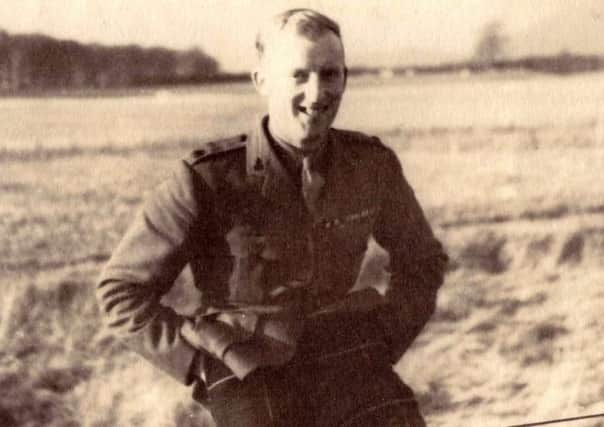Obituary: Col Reggie Kettles OBE MC


Colonel Reginald “Reggie” Kettles, twice decorated as a hero in the Second World War and doubly honoured for his services to his country in the years following, had the misfortune to be caught up in a 1960s controversy that touched off a national outcry.
The nickname, “poison dwarfs”, ever after haunted his command, the 1st Battalion, The Cameronians (Scottish Rifles), and in summer 1962 he was photographed at the side of the soon-to-be- disgraced Secretary of State for War, John Profumo. A cartoon of a “poison dwarf” even appeared in the satirical magazine Private Eye.
Advertisement
Hide AdAdvertisement
Hide AdThe storm erupted after Profumo goaded newsmen that they had “missed a trick” when a court martial for offences by members of another regiment serving, like the Cameronians, in the British Army on the Rhine (BAOR), went unreported. Soon after, a brawl involving men of the Cameronians at the Colosseum Bar in the garrison town of Minden, North Rhine-Westphalia, drew unusual attention, with reporters descending on it and a television film crew arriving.
The tag, a British reporter’s literal translation of a fairly mild German expression of reproof – “Giftzwerg” or “little devil!” touched many nerves: among them, British embarrassment at German criticism and English dislike of the Scots.
Kettles and the Commander in Chief of the BAOR, General Sir James Cassels, flew back to Britain for discussions. Kettles held a press conference, and was praised in the House of Commons on 5 July 1962 for his steadfastness in the face of difficulty: “…he never deviated from the defence of his troops and his regiment. If the Secretary of State had stood as firm as Colonel Kettles we should not be dividing the Committee [forcing a vote] tonight,” Reginald Paget, Labour MP for Northampton, declared.
Kettles, described by colleagues as “unflappable,” remained the 1st Bn’s commanding officer until 1964, and was promoted from Lt Colonel to full Colonel. Profumo, whose affair with the model Christine Keeler had been suspected by reporters since the previous year, despite his denial of it to the House of Commons, resigned in 1963.
Reggie Kettles had served with distinction throughout the Second World War. As a 2nd Lieutenant leading a platoon of 2 Bn The Cameronians close to Fampoux, near Arras, in May 1940 during the retreat to Dunkirk, he had been Mentioned in Dispatches for covering the building of a pontoon bridge, then skilfully withdrawing in face of the enemy; and later for rounding up stragglers and bringing them back to the front line. His commanding officer originally put him in for a Military Cross for his “exceptional initiative”. Kettles, and the Battalion, reached Dover on 1 June. He met his future wife, Rita Ballance, a doctor, at a ball in Liverpool while the Cameronians were stationed there to guard rooftops. They married in 1942, and would have three children, Alexander, Pam and Lindsay.
Kettles was wounded in action in Sicily in 1943. In March 1944, by then a Major leading a company of 2 Bn, he was awarded an immediate Military Cross for restoring the front line, under mortar fire, on the north edge of the Anzio beachhead, after the enemy had overrun a neighbouring company. He “rose magnificently to the dangerous situation…” the recommendation said. “He prevented a widening of the breach”. His “fighting qualities” were, it added, “in great part responsible for the retention by our troops of a most important position”.
Kettles was granted a regular army commission in 1946 in the rank of Captain. He would be appointed MBE in 1953 for “gallant and distinguished services “ in Malaya between 1 July and 31 December 1952 in command of the Support Company of 1Bn The Cameronians. He attended staff college, and also served in Oman and Kenya with 1st Bn.
A military OBE would follow, in 1961, for his service from 1959 as Assistant Quarter Master General (HQ Ops and Plans, Allied Forces Northern Europe) in Oslo, Norway. In 1964 he was one of the British officers leading the Arab troops of the Federal Regular Army in Aden, then a British colony. His daughter, Pam, had a narrow escape when a grenade killed one girl and injured four other youngsters at a party in December 1964 at RAF Khormaksar. To Kettles’s relief, she was only dazed.
Advertisement
Hide AdAdvertisement
Hide AdIn 1966 he became Commandant of the Support Weapons Wing, School of Infantry at Netheravon; and in 1970 became Defence Advisor to the British High Commissioner, Zambia.
Alexander Reginald Kettles, an only child, was the son of a Post Office superintendent telegraphist in Glasgow. He was educated at Glasgow Academy, where he became captain of the rugby side. He joined up in 1940, serving 196 days in the ranks before being picked as officer material and sent, after training, to France with the British Expeditionary Force. His son Alexander died in 2006. His wife predeceased him; his daughters survive him.
Kettles is remembered as a kind, encouraging father who never raised his voice. He liked to keep his watch set five minutes fast so as never to be late.
ANNE KELENY